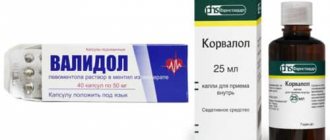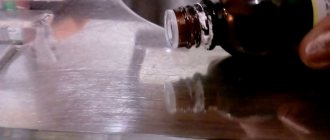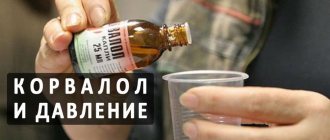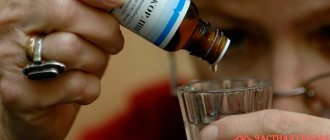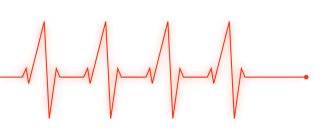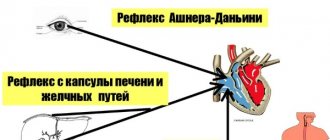Medicines > Corvalol (drops)
This information cannot be used for self-medication!
Consultation with a specialist is required!
Corvalol drops belong to a group of drugs that have antispasmodic and sedative effects, and also make it easier to fall asleep. This is a combination drug, its overall effect is due to the combination of substances included in the drug. The drug is sold without a prescription, available in the form of drops for internal use, available in glass bottles of 25 or 15 ml.
The composition of the drops per 1 ml includes 20 mg of ethyl ether, 1.42 mg of peppermint oil, 3.15 mg of sodium hydroxide, 18.26 mg of phenobarbital, 0.58 ml of the highest purity rectified alcohol and 0.42 ml of purified water . Peppermint relieves spasms, dilates blood vessels, phenobarbital can gently soothe, it is also a sleeping pill. The components help reduce the resulting excitement of the nervous system and help you fall asleep.
Corvalol drops are prescribed to obtain a sedative and vasodilating effect in cases of cardiovascular system disorders, sleep disturbances, neuroses with increased irritability, tachycardia, and agitation accompanied by vegetative manifestations. Drops are also effective for intestinal spasms.
Take the drug in the following dosage: 15–30 drops before meals three times a day. If an attack of tachycardia occurs, the dose is increased to 40–50 drops. As for children, they are given 3–15 drops, based on the age of the child, dividing them into two or three times. The optimal course of treatment will last as many weeks as the doctor says - treatment is individual.
Usually Corvalol is well tolerated by patients, only occasionally daytime drowsiness and mild attacks of dizziness occur. If the drug is taken for a long time, depression, rhinitis, apathy, hemorrhagic diathesis, conjunctivitis, or even impaired coordination of movements in the patient may develop.
Contraindications: renal, liver failure, hypersensitivity to the components of the drug, lactation period. Take with caution throughout pregnancy, the decision is made by the attending physician.
Store the medicine for up to 1.5 years in a dark place, away from children. The air temperature should not exceed 15 degrees.
Reviews about “Corvalol (drops)” from doctors and patients:
Cheap.
Previously, there was opium for the people, now it is Corvalol. Let me explain with an analogy. Truly massive and extremely popular Corvalol was invented in Germany (more precisely, its almost complete analogue is Valocordin). They filmed the post-war depression in the 50s. last century.
Why do I care? Yes, because my elderly relatives drink Corvalol and everyone considers it harmless drops. Well, who doesn’t know Corvalol, its smell, taste? Meanwhile, not a single normal study has been conducted in our country on the effect of this drug on the health of older people. It is known that rats treated with phenobarbital throughout their lives died from cancer. Symptoms of chronic intoxication are also known: drowsiness, irritability, weakness, confusion, hallucinations, convulsions, imbalance, as well as changes in the functioning of the cardiovascular, digestive and urinary systems.
Now think about why your grandmother developed dementia (senile dementia) so early, and why your grandfather died of cancer.
Corvalol: instructions for use
Popular articles
Application of Corvalol
Corvalol is a combination drug that contains phenobarbital, peppermint oil, water, ethyl alcohol and ethyl ether. Thanks to phenobarbital, which has a vasodilating effect, peppermint oil acts more effectively, reducing spasm and dilating blood vessels. When the dose is increased, Corvalol acts as a hypnotic. The drug is used for neuroses of various origins with heart pain and increased irritability, angina pectoris, intestinal spasms, rapid heartbeat, hypertension. Corvalol is well tolerated and may only occasionally cause mild dizziness and drowsiness.
Corvalol drops: dosage
As such, there is no dosage of Corvalol. In the form of drops, the drug is available in 25 ml bottles. They should be taken before meals three times a day, 15-20 drops dissolved in a small amount of water. If necessary, the dose can be increased to 30. In case of an acute attack of tachycardia and severe pain in the chest area, you can drink 40-50 drops. Children can be given from 3 to 15 drops per day. You should not increase the dose on your own or experiment with this drug, as it can cause an overdose. Symptoms of overdose are memory impairment, impaired motor coordination, and the development of a depressed state. In this case, it is necessary to reduce the dose or stop taking the medicine altogether.
Is Corvalol prohibited? Can I take it?
For most people, Corvalol is considered a cure-all, but in fact it cannot be considered useful in the treatment of cardiovascular diseases. Its only effect is to dilate blood vessels and have a calming effect. Corvalol relieves certain symptoms that are caused by stress, not disease. The components of the drug (ethyl bromizovalerate, ethyl alcohol, phenobarbital) accumulate in the body and cause poisoning of internal organs. With long-term use, psychological and physiological dependence is formed (due to phenobarbital, a psychotropic substance that causes depression of the central nervous system and is a hard drug), which leads to poor sleep, anxiety, depression, and memory impairment. In many countries, Corvalol is prohibited, but in Russia it is only available by prescription. So before you take this drug, think about whether you want to die from it?
Corvalol
Corvalol belongs to the group of sedatives. It contains phenobarbital, which is a psychotropic drug, isovaleric acid ester and peppermint leaf oil. Due to the last component, not only the specific smell of Corvalol is provided, but also a reflex antispasmodic and vasodilating effect. A derivative obtained from valerian roots has a calming effect on the nervous system, and in large doses causes drowsiness. Thus, the effect of Corvalol is due to its composition, which, in addition to the listed components, includes ethyl alcohol, sodium hydroxide and water.
Previously, there was only liquid Corvalol, drops of which had to be diluted with a certain volume of water. Currently, for the convenience of patients, Corvalol is produced in tablets for sublingual use.
Corvalol tablets are easy to use
It is interesting that this drug is distributed mainly in the Balkan Peninsula and in Russia. In other countries, they use a medicine that has a similar composition (valocordin). Phenobarbital, which is part of both drugs, is considered a drug in some countries (USA, Lithuania) and is prohibited for import.
Indications for use
The use of Corvalol is indicated for the following conditions:
- changes in the function of the cardiovascular system associated with impaired neurohumoral regulation;
- in complex therapy of neuroses, as well as with increased excitability and irritability;
- for taking the drug Corvalol, indications include difficulty falling asleep due to increased anxiety;
- tachycardia. associated with the influence of the sympathetic nervous system;
- early stages of hypertension and minor spasm of the coronary arteries;
- increased tone of the autonomic nervous system, accompanied by excitement;
- spasms and increased peristalsis of the gastrointestinal tract.
How many drops of Corvalol to take in a given case is determined by the doctor, but the average dosage is 20-40 drops three times a day.
Contraindications
Contraindications for taking Corvalol are individual allergic reactions and intolerance to the components of the drug, as well as severe somatic diseases accompanied by severe renal or liver failure.
The calming effect of Corvalol has a beneficial effect on the cardiovascular system
Overdose
If an acute overdose of Corvalol occurs, intestinal motility slows down, and this leads to constipation.
With long-term use of the drug, chronic bromine poisoning is possible, which is manifested by depression and apathy, as well as damage to the mucous membranes (rhinitis, conjunctivitis), blood vessels (hemorrhagic diathesis) and the central nervous system (impaired speech, memory, attention, unsteadiness of gait). Libido often decreases and impotence develops.
Side effects
Side effects usually do not occur with the correct dosage of the drug. However, dizziness and daytime drowsiness may sometimes occur. In some cases, drug dependence develops, and when it is discontinued, abstinence occurs.
Corvalol and alcohol
This drug is often used to eliminate symptoms that occur after drinking large amounts of alcohol (hangover). These include increased heart rate. increased blood pressure, increased excitability. Due to the fact that Corvalol and alcohol have a sedative effect, when used together, an overdose and various side effects may develop.
Corvalol during pregnancy
Corvalol can be used during pregnancy, as well as during breastfeeding, only under strict indications. That is, if the expected benefit exceeds the harm that is likely to be caused to the child. This is due to the fact that phenobarbital, which is part of this medicine, can negatively affect the condition and development of the baby’s central nervous system, and also lead to intrauterine hypoxia.
Corvalol for children
Corvalol can be prescribed to children in special situations, and the dose should be reduced depending on age (one drop per one year of life). Interestingly, some doctors prescribe its use almost from birth, while others do not recommend taking it before 12 years of age. Since there is no consensus on this matter, it is worth listening to the opinion of your doctor, since only he has sufficient information about the child.
Corvalol is an indispensable drug in some situations when it is necessary to eliminate the symptoms of severe shock or dysfunction of the nervous system. It is also suitable as a temporary measure for tachycardia and hypertension. However, with long-term use, Corvalol often causes addiction and the development of side effects. Therefore, you should not self-medicate, but rather seek help from a specialist.
hemorrhagic vasculitis in children (video for doctors)
Medicines for tachycardia
Medicines for tachycardia
Tachycardia is a condition known to almost every person, even if he is not familiar with this medical term. Tachycardia is a rapid heartbeat that we feel in a moment of fright, after hearing good news, after physical exertion and under other circumstances. But often the heart “jumping out” of the chest makes us worry and think whether everything is okay with our health, whether the accelerated heart rate is a symptom of some disease. And perhaps it’s time to see a doctor for a remedy for tachycardia?
Types of tachycardia and the reasons for its occurrence
Tachycardia can develop for several reasons. Among them, three broad categories can be distinguished.
Physiological. In this case, we are talking about a natural reaction of the cardiovascular system, a short-term increase in heart rate that occurs in response to physical activity, the use of any stimulants (strong tea, coffee, energy drinks, etc.), an increase in body temperature or exposure to hot weather. indoors. As a rule, with physiological tachycardia, a person’s heart rate can reach 90–180 beats per minute (but not higher). Approximately 5 minutes after eliminating the causes of tachycardia, the heart rate returns to normal. At the same time, in a normal state, a person does not feel chest pain, dizziness, or blurred vision (blurred vision and spots before the eyes). These symptoms are not natural.
Psychogenic. Any stressful event makes the heart beat faster. At the same time, stress does not mean only negatively colored situations: a long-awaited meeting with friends, happy news and other joyful events can be accompanied by tachycardia. But, like the physiological one, it must last a certain amount of time, after which the heart rate returns to normal. If stress is prolonged, it can negatively affect the functioning of the cardiovascular system.
Organic (pathological). It is characterized by an increase in heart rate at rest, i.e., rapid heartbeat is not caused by physical activity or emotional shock. As a rule, pathological tachycardia is the result of congenital or acquired diseases of the cardiovascular system or other organs. When the heart beats quickly, it does not have time to relax and fill, which leads to a decrease in blood output and, consequently, to oxygen starvation of the heart muscle and the entire body. Pathological tachycardia can be a sign of cardiosclerosis, rheumatism, heart disease, myocardial infarction, circulatory failure. Also, rapid heartbeat can be observed in chronic anemia, thyrotoxicosis, acute pain attacks (for example, hepatic colic).
In addition, rapid heartbeat often occurs in pregnant women due to changes in the body, impaired water-salt metabolism, gestosis, etc. And hypothyroidism in the mother or oxygen deficiency can cause tachycardia in the fetus.
In adolescence, attacks of rapid heartbeat are also not uncommon. This is often due to the fact that the autonomic nervous system, which is responsible for regulating heart rate, undergoes changes due to the restructuring and maturation of the entire organism. In such cases, the doctor may prescribe medications for tachycardia, which can eliminate unpleasant symptoms and ensure proper functioning of the heart.
Symptoms of tachycardia
Symptoms of tachycardia arising from organic diseases. Tachycardia caused by any disease is rarely present as an independent condition and is often accompanied by other symptoms. These include:
- pressing pain in the sternum;
- sharp darkening of the eyes;
- frequent attacks of dizziness;
- periodic loss of consciousness or borderline state in the form of a feeling of stupor;
- shortness of breath;
- weakness;
- high blood pressure.
Symptoms of tachycardia with VSD. With VSD of the sympathoadrenal type, heart contractions reflexively increase. This condition may be accompanied by the following symptoms:
- sudden darkening of the eyes;
- rapid heartbeat at rest without any objective reasons;
- feeling of lack of air;
- chills, feeling of coldness in the extremities;
- a feeling of tightness or a lump in the throat;
- frequent urge to urinate after an attack with the release of large amounts of urine.
Treatment of tachycardia
Attacks of tachycardia that are observed without any objective reasons (for example, in a state of complete physical and mental rest) or develop in response to minor stimuli are a reason to consult a doctor. Depending on the results of the examination, the specialist will prescribe tablets or drops to treat the identified disease, normalize heart function or medication for tachycardia, and also give additional recommendations.
Emergency first aid. In cases of a sudden attack of tachycardia, you must immediately call a doctor, then lie down comfortably, unbutton your shirt collar, belt and other items of clothing that put pressure on the body. People nearby should provide the patient with maximum peace and fresh air.
Antiarrhythmic drugs. This medicine for tachycardia reduces the heart rate through several mechanisms. It could be:
- control of biochemical reactions that are responsible for heart contractions;
- decreased muscle tone and calming effect on the heart muscle;
- slowing down the conduction of the electrical signal from the pacemaker to the heart, etc.
Such medications should be taken only under the supervision of a physician, with regular assessment of their effect on the human body.
Medicines to increase or decrease blood pressure. In diseases of the cardiovascular system, tachycardia is often accompanied by hyper- or hypotension. In this case, drugs that increase or decrease blood pressure and relieve vascular spasms can help reduce excessive stress on the heart and blood vessels.
Sedatives. For tachycardia, sedative medications can help reduce the increased heart rate, which is caused by excessive emotionality, stress, irritability and other external circumstances. Drops and tablets for tachycardia and other severe manifestations of autonomic disorders Corvalol PHYTO1 belong to this drug group. They contain natural plant components (peppermint leaf essential oil, motherwort herb extract, ethyl bromizovalerianate) that can reduce heart rate and at the same time increase their strength. They have a mild hypotensive property, have a relaxing effect on smooth muscles and can reduce the symptoms of stress (irritability, sleep disturbances, etc.). Corvalol FITO does not contain phenobarbital.
Vitamin and mineral complexes. Such drugs have a general strengthening effect, and also in complex treatment can help eliminate tachycardia, which is caused by vitamin deficiencies, overwork, chronic stress, etc.
___________
1 Has contraindications. Before using the drug, consultation with a specialist is necessary.
